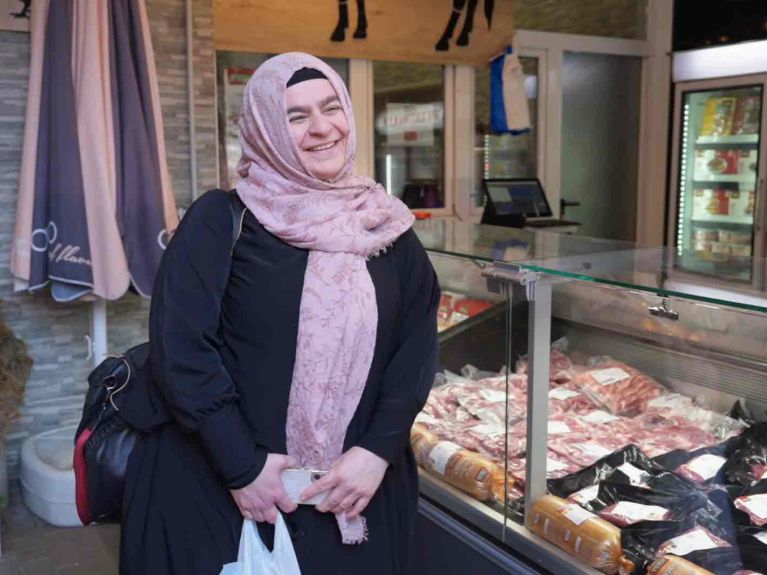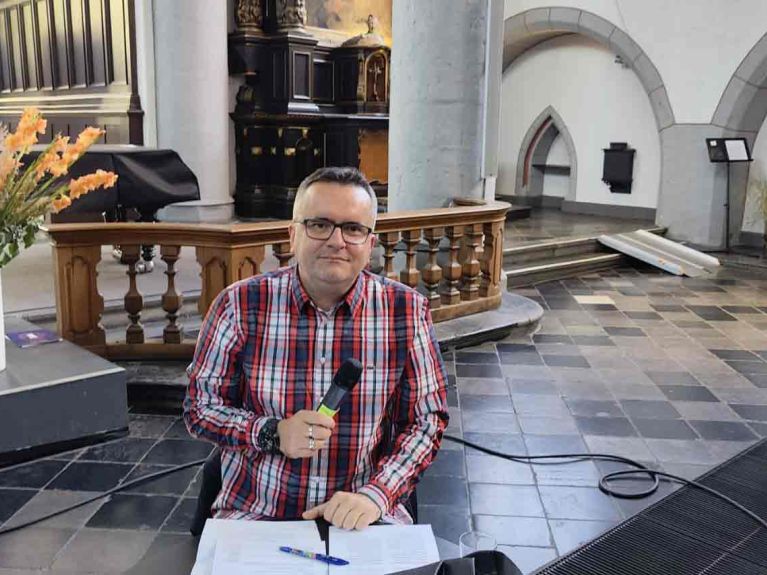Daily life for a Muslim in Germany
Muslims are the second-largest religious group in Germany. Feyza Bayraktar and Erdin Kadunić talk about how they practise their faith.

Thanks to the vegetarians and vegans, Feyza Bayraktar says with a smile, she can now do her shopping with greater peace of mind these days. “If a vegan symbol is on the packaging I can be sure that it really won’t contain any animal products.” If it also contains no alcohol, then the product will most probably count as “halal” - i.e. allowed according to Muslim dietary laws. Feyza is a practising Muslim. Of Turkish decent, she was born in Mannheim and lives near Cologne. While doing her shopping at Tuna, a Turkish butcher’s shop in Cologne’s trendy Ehrenfeld district, she talks about her Muslim-influenced daily life in Germany.
Shopping
For Feyza, doing the shopping is a routine part of her life. “Basically we just buy our groceries in a normal supermarket. It’s only meat that we get from a butcher where we know everything is halal.” It is estimated that there are over 10,000 Turkish and Arabic supermarkets in Germany that sell halal products. However, long-established German supermarket chains are also responding to the demand for foods that comply with Islamic laws and are broadening their ranges - offering everything from sucuk sausage to börek pastries and even introducing special sections with date biscuits and dry fruits during Ramadan. Feyza’s parents also used to go to the butcher’s shop Tuna, which also has its own restaurant, which is why she prefers to buy her meat there. Feyza buys meat and sausages, chatting to the staff at the counter in Turkish and German and a mixture of the two.
Erdin Kadunić also uses several languages - specifically, German, Serbian, Croatian and Bosnian. A political scientist, he grew up in Berlin and lived for nine years in Bosnia and Herzegovina. These days, he works as an interpreter and translator of Balkan languages in Düsseldorf. He was the chairman of the Bosnian mosque community in Düsseldorf, one of the 80 or so Bosnian mosque communities in Germany, and practises his Muslim faith. The 49-year-old recalls that it wasn’t always as easy for Muslims to go shopping or out for a meal as it is today. “Nowadays, halal is no longer a foreign concept. That’s a major advantage.” Like Feyza, Erdin also tends to buy his meat in a Turkish supermarket, though he says that some German butchers also offer halal products. He does most of his shopping at the nearest discount supermarket. Anyone wanting to be on the safe side can consult the “halalcheck” app. In it, a team based in Bonn lists the products and ingredients, such as emulsifiers and flavourings, that count as halal.
Dieses YouTube-Video kann in einem neuen Tab abgespielt werden
YouTube öffnenThird party content
We use YouTube to embed content that may collect data about your activity. Please review the details and accept the service to see this content.
Open consent formMosques and prayer rooms
There is also a prayer app that reminds users when it is time for the five daily prayers. It sometimes takes a bit of organisation to reconcile the demands of religion and work. “Whenever possible, I pray at home and then come into work. But on days when that isn’t possible I find a corner in the office to pray.” Feyza has no problems combining work and prayer. Her boss is a Muslim himself so knows what she needs to do. “I never had any problems with that at my previous workplace either. I was working at a Catholic centre where they provided me with a room in which to pray during the lunchbreak. Personally, I’ve never had any problems with that.” The daily prayers do not pose a problem for Erdin either, as he has his own office and can decide himself when to work. Not everyone finds it so easy to arrange their daily prayers, however, stress Feyza and Erdin. Some people have colleagues or a boss who are not so understanding. “Many Muslims then catch up on their prayers when they get home because they were unable to pray at work or didn’t want to ask,” explains Erdin.

Germany is home to roughly 5.5 million people of Muslim faith. That equates to 6.6 percent of the total population. After members of Christian churches, Muslims are thus the second-largest religious group in Germany. According to surveys conducted by the German Islam Conference, 70 percent of Muslims comply with Islamic rules such as the dietary laws, and almost 40 percent perform the daily prayers. It is estimated that there are around 2,700 mosques in Germany. In addition, there are numerous prayer rooms at airports, railway stations and in office buildings. “But even if there doesn’t happen to be a prayer room nearby, we quickly find a solution,” laughs Feyza. A small quiet spot is often enough, she says. Pilgrimages to Mecca are another element of the Muslim faith. These days, there are also travel agents in Germany that offer organised trips. “There are many companies that will book board and lodging for you - anything from quite simple rooms to luxury hotels with good food and a view of the Kaaba,” explains Erdin.
“Most of the time you can live a good life as a Muslim in Germany. We have our prayer rooms, shopping is not a problem. The only issue arises when somebody doesn’t respect another person’s faith,” says Feyza. And this does happen, she adds. Erdin agrees: “Not all colleagues at work are always understanding - about prayer times, for instance.” On the other hand, there are signs of more openness, he says. This year, Frankfurt city centre was illuminated for the first time to celebrate Ramadan, with crescent moons and “Happy Ramadan” messages. “In a few years, nobody will talk about it any more - it will be completely normal,” says Erdin. “That feels good,” Feyza says. Just like in other countries, racism is unfortunately encountered at times in German society. As Feyza explains, however, those who oppose racism are speaking out increasingly loudly.
Breaking the fast
Feyza works in the textiles industry. After work, she helps the homeless on avoluntary basis. Several times a week she drives a minibus around the city centre, distributing food, clothing, sanitary products - or simply advice. When she arrives at the distribution point at Cologne train station, people are already waiting and welcome her with a hug. It is Ramadan and Feyza is fasting. She shows no sign of the fact that she has drunk and eaten nothing all day. She switches from one conversation to the next, full of energy and empathy. Then she receives a notification on her app. It is 7 pm. Time to break her fast. Feyza opens a smoothie, saying that that will do her for now. Later she will have a proper meal once those waiting in line have eaten. Best of all she likes vegetarian food.







